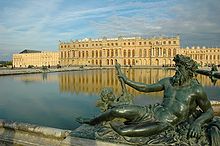Grand Siècle
You can help expand this article with text translated from the corresponding article in French. (April 2019) Click [show] for important translation instructions.
|

Grand Siècle or Great Century refers to the period of French history during the 17th century, under the reigns of Louis XIII and Louis XIV.[2]
The period was notable for its development of art and literature, along with the construction of the Palace of Versailles, the effects of the French Wars of Religion, and the impacts of the Thirty Years' War.[2][3] Significant figures during this period include gardener André Le Nôtre, architect François Mansart, painter Nicolas Poussin, painter Philippe de Champaigne, painter Charles Le Brun, playwright Molière, poet Jean de La Fontaine, playwright Jean Racine, playwright Pierre Corneille, writer Charles Perrault,[4] composers Henri Dumont, Jean-Baptiste Lully, Marc-Antoine Charpentier, Michel Richard Delalande, André Campra, Henri Desmarest, Marin Marais and François Couperin, philosophers René Descartes, Blaise Pascal, Antoine Arnauld and the Port-Royal, Nicolas Malebranche, Pierre Gassendi, La Rochefoucauld, La Bruyere, and Pierre Bayle.[2]
See also
[edit]References
[edit]- ^ Blanning, T. C. W. (2002). The Culture of Power and the Power of Culture: Old Regime Europe 1660–1789. Oxford University Press. p. 33-44. doi:10.1093/acprof:oso/9780198227458.001.0001. ISBN 978-0-1982-2745-8.
- ^ a b c "The Grand Siecle & The Age Of Enlightenment". France.fr. Retrieved April 26, 2019.
- ^ Bluche, François (2005). Dictionnaire du Grand Siècle 1589-1715 (in French). Fayard. ISBN 978-2213621449.
- ^ Montoya, Alicia (2013). Medievalist Enlightenment: From Charles Perrault to Jean-Jacques Rousseau. DS Brewer. ISBN 9781843843429.
